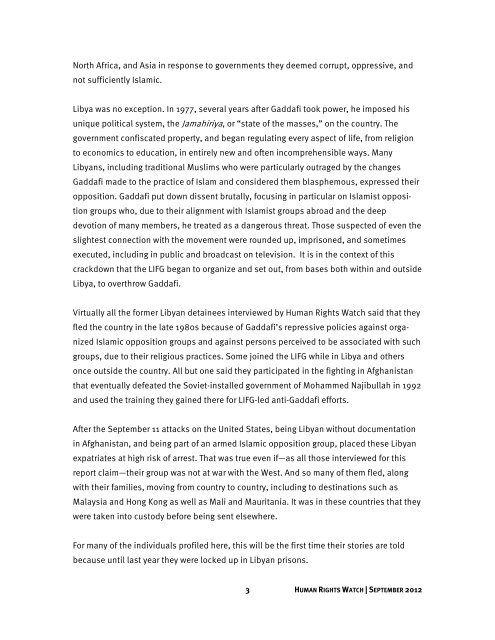Delivered Into Enemy Hands - Human Rights Watch
Delivered Into Enemy Hands - Human Rights Watch
Delivered Into Enemy Hands - Human Rights Watch
You also want an ePaper? Increase the reach of your titles
YUMPU automatically turns print PDFs into web optimized ePapers that Google loves.
North Africa, and Asia in response to governments they deemed corrupt, oppressive, and<br />
not sufficiently Islamic.<br />
Libya was no exception. In 1977, several years after Gaddafi took power, he imposed his<br />
unique political system, the Jamahiriya, or “state of the masses,” on the country. The<br />
government confiscated property, and began regulating every aspect of life, from religion<br />
to economics to education, in entirely new and often incomprehensible ways. Many<br />
Libyans, including traditional Muslims who were particularly outraged by the changes<br />
Gaddafi made to the practice of Islam and considered them blasphemous, expressed their<br />
opposition. Gaddafi put down dissent brutally, focusing in particular on Islamist opposition<br />
groups who, due to their alignment with Islamist groups abroad and the deep<br />
devotion of many members, he treated as a dangerous threat. Those suspected of even the<br />
slightest connection with the movement were rounded up, imprisoned, and sometimes<br />
executed, including in public and broadcast on television. It is in the context of this<br />
crackdown that the LIFG began to organize and set out, from bases both within and outside<br />
Libya, to overthrow Gaddafi.<br />
Virtually all the former Libyan detainees interviewed by <strong>Human</strong> <strong>Rights</strong> <strong>Watch</strong> said that they<br />
fled the country in the late 1980s because of Gaddafi’s repressive policies against organized<br />
Islamic opposition groups and against persons perceived to be associated with such<br />
groups, due to their religious practices. Some joined the LIFG while in Libya and others<br />
once outside the country. All but one said they participated in the fighting in Afghanistan<br />
that eventually defeated the Soviet-installed government of Mohammed Najibullah in 1992<br />
and used the training they gained there for LIFG-led anti-Gaddafi efforts.<br />
After the September 11 attacks on the United States, being Libyan without documentation<br />
in Afghanistan, and being part of an armed Islamic opposition group, placed these Libyan<br />
expatriates at high risk of arrest. That was true even if—as all those interviewed for this<br />
report claim—their group was not at war with the West. And so many of them fled, along<br />
with their families, moving from country to country, including to destinations such as<br />
Malaysia and Hong Kong as well as Mali and Mauritania. It was in these countries that they<br />
were taken into custody before being sent elsewhere.<br />
For many of the individuals profiled here, this will be the first time their stories are told<br />
because until last year they were locked up in Libyan prisons.<br />
3 HUMAN RIGHTS WATCH | SEPTEMBER 2012
















